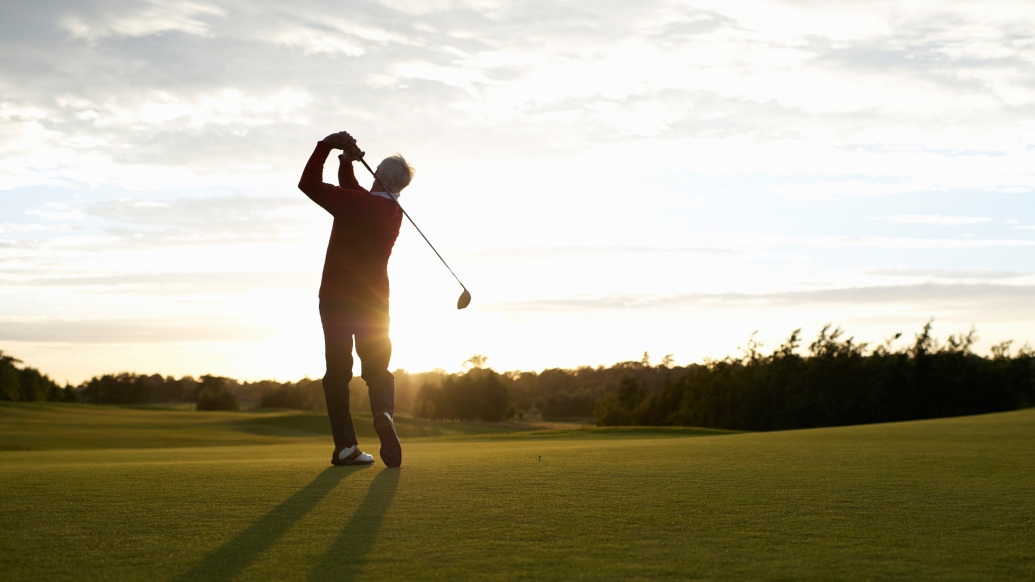Activities may represent modifiable risk factors for the disease
5:00 AM
Author |

Participation in recreational activities — including golfing, gardening or yard work, woodworking and hunting — may be associated with an increase in a person’s risk for developing amyotrophic lateral sclerosis, or ALS, a Michigan Medicine study finds.
While many activities were associated with increased ALS risk, several were sex specific. The results are published in the Journal of the Neurological Sciences.
“We know that occupational risk factors, like working in manufacturing and trade industries, are linked to an increased risk for ALS, and this adds to a growing literature that recreational activities may also represent important and possibly modifiable risk factors for this disease,” said first author Stephen Goutman, M.D., M.S., director of the Pranger ALS Clinic and associate director of the ALS Center of Excellence at University of Michigan.
“Future studies should include these activities to pinpoint how they can be understood in the context of ALS prevention, diagnosis and treatment.”
Investigators surveyed 400 people living with ALS and nearly 300 without the condition to assess their hobbies and non-work related activities.
They found that golf was associated with three times greater risk for developing ALS among men. Participation in gardening or yard work, as well as woodworking and hunting, was also linked with a heightened risk for men.
When broken down by sex, no recreational activities had significant associations with ALS for females. None of the hobbies were linked to earlier onset of, or death from, ALS for either sex.
“It is surprising that the risk factors we identified appear to be specific to males,” Goutman said.
“While these activities may also increase ALS risk in females, the number of females in our study was too small for us to come to that conclusion.”
The findings join the growing body of evidence suggesting that environmental exposures affect a person’s risk for getting and dying from amyotrophic lateral sclerosis. Researchers call this lifetime accumulation of exposures the ALS exposome.
“Our goal is to understand what occupations and hobbies increase ALS risk because identifying these activities provides the first step towards ALS prevention."
--Eva Feldman, M.D., Ph.D.
Hobbies such as golfing and gardening or yardwork, Goutman says, may confer risk due to the use of pesticides. A past study connected occupations in golf and garden maintenance to increased ALS risk.
Extensive studies of woodworking lead researchers to believe that formaldehyde exposure during the hobby could be attributed to higher risk.
“Our goal is to understand what occupations and hobbies increase ALS risk because identifying these activities provides the first step towards ALS prevention,” said senior author Eva Feldman, M.D., Ph.D., director of the ALS Center of Excellence at U-M and James W. Albers Distinguished University Professor at U-M.
“For a disease like Alzheimer’s, we know that a list of factors — including smoking, obesity and high lipids — can increase risk by 40%. Our goal is to establish a similar list for ALS to create a roadmap to decrease risk. With apologies to Robert Frost, it is currently the ‘road not taken’, and we want to change that.”
Prospective studies are underway to examine individuals who work in production, manufacturing and jobs that involve use of metals, and for persons with a family history of ALS.
Both Goutman and Feldman say it is too early for clinicians to advise that patients stop doing any of these activities.
Additional authors: Additional authors include Jonathan Boss, Ph.D., Dae Gyu Jang, Ph.D., Caroline Piecuch, Hasan Farid, Madeleine Batra, Bhramar Mukherjee, Ph.D., and Stuart A. Batterman, Ph.D., all of University of Michigan.
Funding: This study was supported by the National Institutes of Health, The National ALS Registry/CDC/ATSDR, the ALS Association, the NeuroNetwork for Emerging Therapies, the Robert and Katherine Jacobs Environmental Health Initiative, the NeuroNetwork Therapeutic Discovery Fund, the Peter R. Clark Fund for ALS Research, the Sinai Medical Staff Foundation, Scott L. Pranger, and the University of Michigan.
Citation: “Avocational exposure associations with ALS risk, survival, and phenotype: A Michigan-based case-control study,” Journal of the Neurological Sciences. DOI: 10.1016/j.jns.2024.122899
Sign up for Health Lab newsletters today. Get medical tips from top experts and learn about new scientific discoveries every week by subscribing to Health Lab’s two newsletters, Health & Wellness and Research & Innovation.
Sign up for the Health Lab Podcast: Add us on Spotify, Apple Podcasts or wherever you get you listen to your favorite shows.

Explore a variety of health care news & stories by visiting the Health Lab home page for more articles.

Department of Communication at Michigan Medicine

Want top health & research news weekly? Sign up for Health Lab’s newsletters today!





